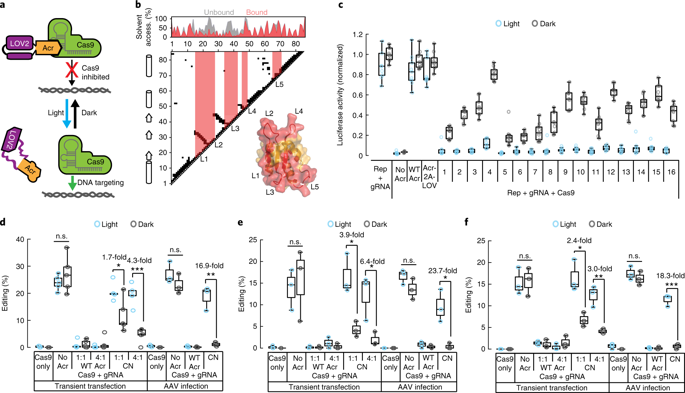Nature Methods ( IF 36.1 ) Pub Date : 2018-10-30 , DOI: 10.1038/s41592-018-0178-9 Felix Bubeck , Mareike D. Hoffmann , Zander Harteveld , Sabine Aschenbrenner , Andreas Bietz , Max C. Waldhauer , Kathleen Börner , Julia Fakhiri , Carolin Schmelas , Laura Dietz , Dirk Grimm , Bruno E. Correia , Roland Eils , Dominik Niopek

|
Anti-CRISPR proteins are powerful tools for CRISPR–Cas9 regulation; the ability to precisely modulate their activity could facilitate spatiotemporally confined genome perturbations and uncover fundamental aspects of CRISPR biology. We engineered optogenetic anti-CRISPR variants comprising hybrids of AcrIIA4, a potent Streptococcus pyogenes Cas9 inhibitor, and the LOV2 photosensor from Avena sativa. Coexpression of these proteins with CRISPR–Cas9 effectors enabled light-mediated genome and epigenome editing, and revealed rapid Cas9 genome targeting in human cells.
中文翻译:

工程化的抗CRISPR蛋白,用于CRISPR–Cas9的光遗传学控制
抗CRISPR蛋白是用于CRISPR–Cas9调控的强大工具;精确调节其活性的能力可以促进时空限制的基因组扰动并揭示CRISPR生物学的基本方面。我们设计了一种光遗传学抗CRISPR变体,包括AcrIIA4,一种有效的化脓性链球菌Cas9抑制剂和来自Avena sativa的LOV2光传感器的杂种。这些蛋白与CRISPR–Cas9效应子的共表达使光介导的基因组和表观基因组编辑成为可能,并揭示了在人类细胞中快速靶向Cas9基因组。











































 京公网安备 11010802027423号
京公网安备 11010802027423号